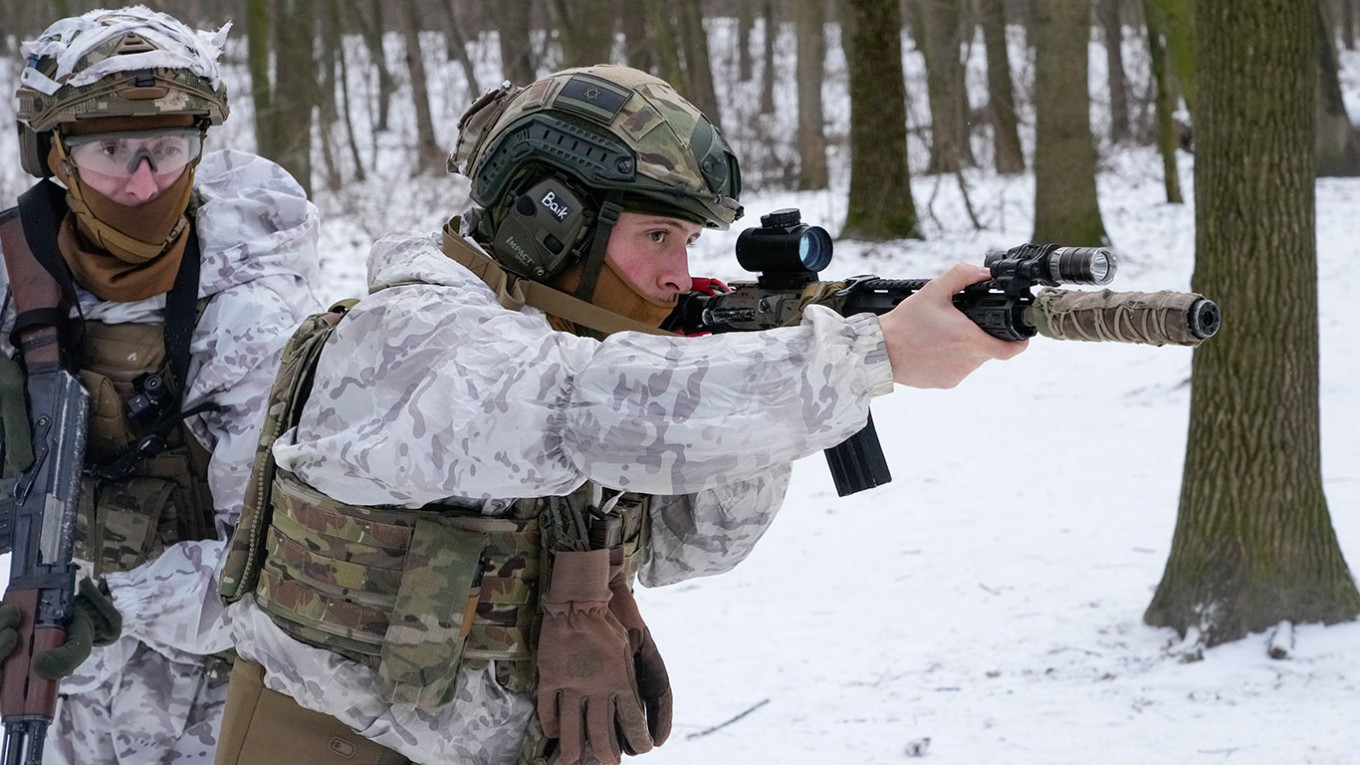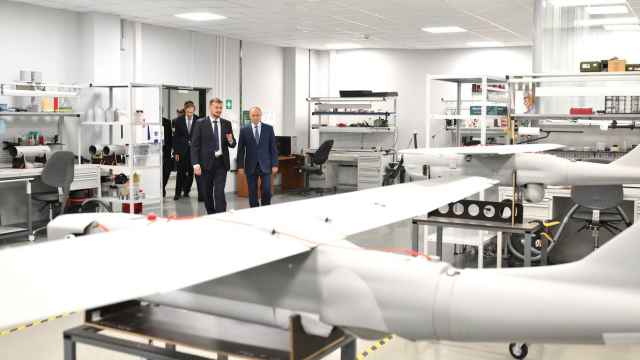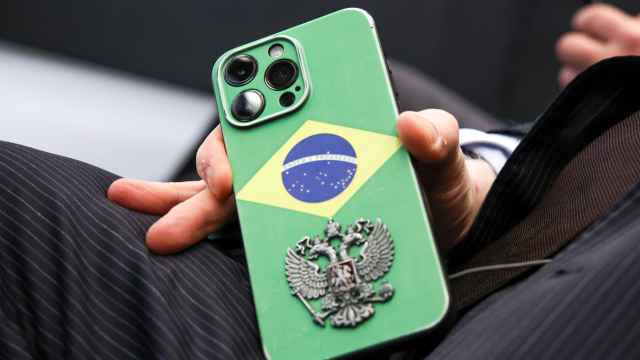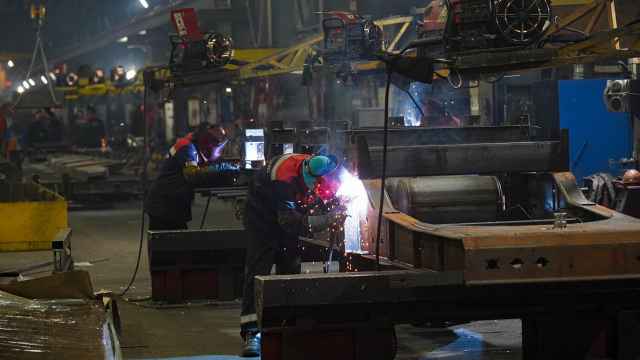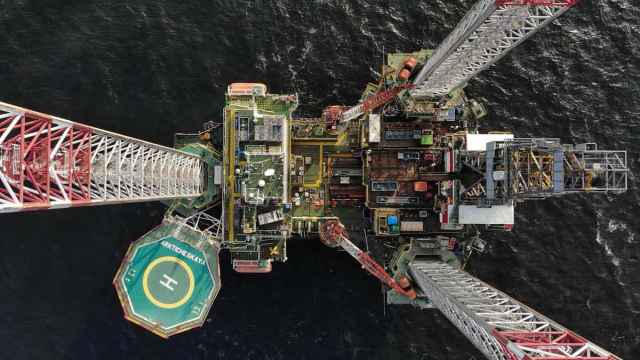Russia’s business elite is bracing for possible military conflict, billions in lost value and new rounds of hard-hitting Western sanctions in silent despair — unable to influence the course of events and unwilling to speak out publicly, business owners and representatives told The Moscow Times.
Russia’s stock market has been in steep decline in recent weeks and the value of the ruble has cratered to an almost all-time low as the standoff between Russia and the West over Ukraine shows no sign of abating.
“This topic has suddenly become the main point of conversation among business people like me — not the oligarchs but the successful Russians just below them,” said a senior veteran banker at a private firm, speaking on condition of anonymity.
“We are wealthy and have a lot to lose. A lot of us have second homes in Europe, we have residency permits in the West, so we are heavily invested in this,” he added.
None of the senior business figures or high-net-worth individuals The Moscow Times contacted were prepared to speak publicly about their views on the economic consequences of the diplomatic crisis and possible slide to war.
Wealthy Russians have already been hit hard, with the ruble falling sharply in recent weeks and a stock market crash that has wiped $150 billion off the value of Russia’s top companies. But despite U.S. threats of sanctions that could “devastate” the Russian economy and the prospect of travel bans and asset freezes for those at the top of the country’s corporate ladder, there has been almost no public outcry, concern, pushback, or even discussion about the economic damage of a military confrontation.
“While nobody wants war, don’t expect big business to stand up and voice their opposition,” the investment banker said. “We have become passengers. The business community will only discuss war in their kitchens. Everybody will stay quiet in public.”
Business comes second
Russia’s business elite, oligarchs and heads of the country’s sprawling state-owned enterprises, are known for their loyalty to the Kremlin.
One of Putin’s first battles as president almost two decades ago was to tame the political power of Russia’s leading oligarchs. Many of those in business today understand they hold their positions only as long as President Vladimir Putin and his inner circle allow it. While they may bicker gently in public about tax rates, investment schemes or government support, foreign policy is off limits.
This approach has brought many — including those beyond Putin’s chosen inner business circle — wealth and status, but in times of crisis that comes second to patriotism and loyalty.
As sanctioned billionaire businessman and Putin ally Gennady Timchenko said when Russia faced economic crisis following the annexation of Crimea in 2014: “Personal inconveniences and costs to one’s business can and should be neglected when it comes to the interests of the state.”
Amid this understanding of the limits of corporate Russia’s ability to influence the Kremlin — and the pointlessness of speaking out — some of Russia’s business elite are resigned to what could happen.
“We can’t do much when bigger political powers are at play. Our hands are tied,” said one businessman from the Russian Forbes 200 list of the country’s wealthiest individuals, who has business interests in both Russia and Ukraine.
“I expect a further deterioration in relations which will impact Russia’s economy negatively, of course. But big business will just have to ride it out like we have before — we’re no stranger to this.”
“It’s impossible to plan ahead or somehow try to protect our interests, because we don’t know what will happen and how the West will react,” he added.
Business insiders and advisers also questioned what practical steps Russian businesses could take at this stage to protect their assets and investments.
“Things have moved incredibly fast over the last month. There isn’t much that people with wealth can do at this moment to protect themselves against a possible invasion — it is a bit too late for that,” said the investment banker. “Russian assets are not in high demand, the ruble is crashing and any liquid assets are already being transferred abroad.”
Outsiders with connections to the Russian elite also suggested the country’s richest are hurting at the sight of a looming, self-induced economic crisis, but unwilling to say so publicly.
“I used to know well several CEOs of these companies,” former U.S. Ambassador to Russia Michael McFaul wrote on Twitter on Tuesday, in response to the stock market slide. “I am pretty sure I can predict their private views of these senseless war preparations, let alone war. Their views expressed in public, of course, will be different.”
The U.S. has proposed a draft sanctions package to be introduced if Russia takes aggressive military action against Ukraine. It would require President Joe Biden to sanction at least three of Russia’s leading banks by cutting them off from the global financial system, possibly block U.S. dollar transactions and give him the power to sanction basically any leading Russian business figure as desired.
Calm exterior
But there are islands of calm amid the market storm. Rostislav Ordovsky-Tanaevsky Blanco, one of the country’s largest restaurateurs, told The Moscow Times he expects the war talk to die down. “The West is starting to listen — there is hope that things will end in some balancing act.”
Russian corporates have, on the whole, taken the talk of a possible invasion cautiously, said Tom Blackwell, CEO of EM Communications, a corporate advisory firm that represents a host of Russia’s largest companies.
“There’s a huge difference in the mood between the people looking at Russia from the outside and the people here,” he said in an interview.
“There’s certainly been volatility in the stock market. But other than that, I’m not sure there are concrete examples of businesses hurting, having to do things or being overly impacted by this at the moment.”
Some Russian businesses have taken steps to prop up their plunging share prices amid the market rout.
State-owned Sberbank, Russia’s largest bank, will embark on a 50-billion ruble ($640 million) share buyback scheme — an announcement which offered only short-lived respite to the bank’s battered share price, down 21% since the start of the year. Discount retailer Fix Price also announced a smaller buyback program Monday, while privately owned energy giants Novatek and Lukoil have also upped existing share buyback programs in recent days.
“I’m sure there are a lot of companies feeling that they’re undervalued,” said Blackwell. “I wouldn’t be surprised if you see a development of the buyback trend in the short-term.”
Foreign investors and firms in the capital are also presenting a steady exterior.
“I wouldn’t define the mood as panic. It’s business as usual — because business has gotten accustomed to this situation over the years,” said one representative of a business association, who also requested anonymity citing the “politically sensitive situation.”
Businesses in Russia have been through several rounds of war and sanctions scares since 2014, when Moscow annexed Crimea and started backing separatist forces in eastern Ukraine. Foreign investment collapsed in the aftermath, and experts say it may never reach pre-Crimea levels again. That has had a hardening effect on the firms that remained — only those with the highest appetites for risk — which could be behind some of the public displays of calmness at the moment.
Analysts and experts were unsurprised Russian business figures, including foreign investors, were unwilling to speak publicly about the situation, but said contingency plans were being drawn up.
“Everyone’s scouring the headlines for the next escalation. The withdrawal of some staff by the U.K. and U.S. embassies in Kyiv has put businesses on alert, although understandably some investors see this as an overreaction at this stage,” said Chris Tooke, associate director at political risk firm GPW.
"Businesses are looking for what could be a trigger moment that means war is a certainty, when the situation could rapidly change — for instance, a complete breakdown of these security talks. So far there’s been no single event that would have firms start implementing those contingency plans.”
With market chaos, others — those with the right connections — have sought opportunities to cash in.
“After a couple of conversations with the guys directly involved in the Donbass, I transferred all my assets to dollars and sold my Russian stocks,” one official at a Moscow government department told The Moscow Times. “This was back in December when nobody expected anything.”
A Message from The Moscow Times:
Dear readers,
We are facing unprecedented challenges. Russia's Prosecutor General's Office has designated The Moscow Times as an "undesirable" organization, criminalizing our work and putting our staff at risk of prosecution. This follows our earlier unjust labeling as a "foreign agent."
These actions are direct attempts to silence independent journalism in Russia. The authorities claim our work "discredits the decisions of the Russian leadership." We see things differently: we strive to provide accurate, unbiased reporting on Russia.
We, the journalists of The Moscow Times, refuse to be silenced. But to continue our work, we need your help.
Your support, no matter how small, makes a world of difference. If you can, please support us monthly starting from just $2. It's quick to set up, and every contribution makes a significant impact.
By supporting The Moscow Times, you're defending open, independent journalism in the face of repression. Thank you for standing with us.
Remind me later.




